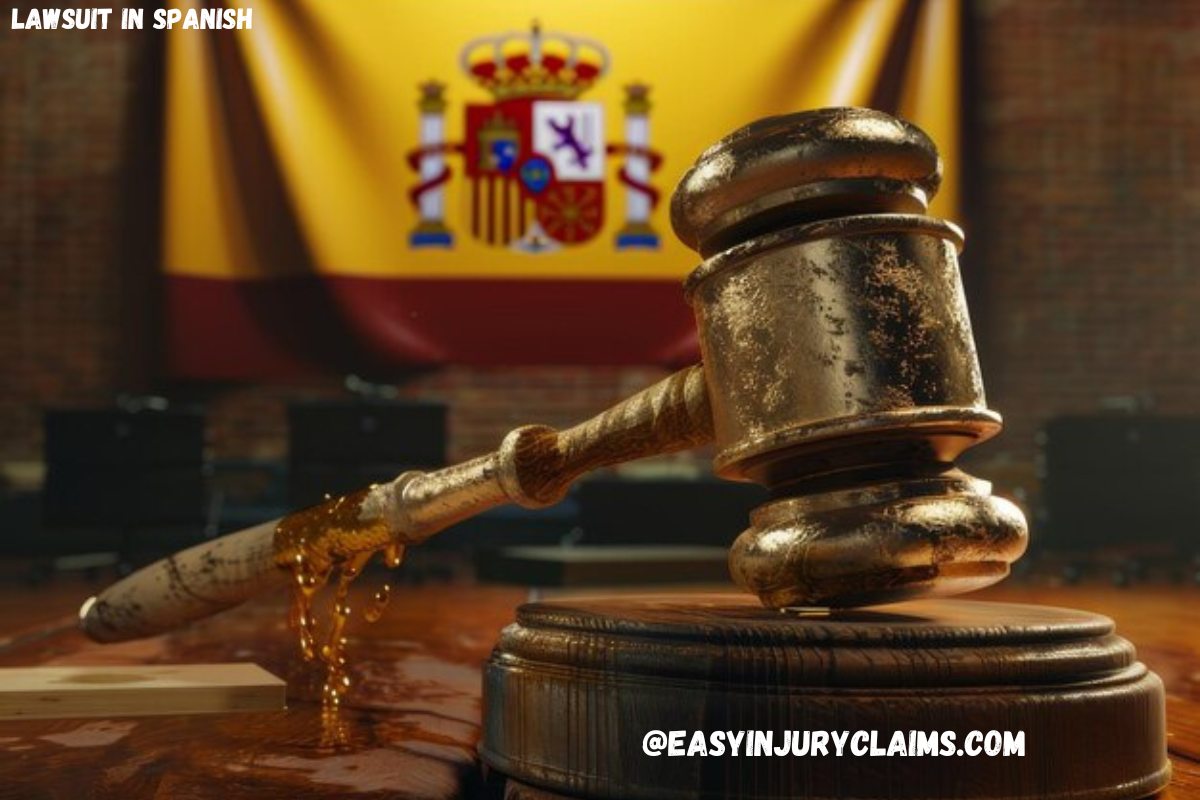Introduction to Lawsuits in Spanish
A lawsuit is a legal case where one person, called the plaintiff, takes another person or company to court. This happens when there is a problem that they cannot solve without a judge. Many people who speak Spanish might need to understand what a lawsuit is and how it works in their language.
What is a Lawsuit?
A lawsuit is when someone wants justice from the court. It can be for many reasons, like not paying money, causing injury, or breaking a contract. A lawsuit can be a civil lawsuit or a criminal lawsuit. In a civil lawsuit, one person sues another person or a company. In a criminal lawsuit, the government takes action against someone for a crime.
Understanding Legal Terminology in Spanish
Understanding the right words is important in any legal case. Many people find it difficult to understand legal documents, especially if they are in English. Knowing the legal terminology in Spanish helps them know their rights. For example, “lawsuit” in Spanish is “demanda,” “plaintiff” is “demandante,” and “defendant” is “demandado.” Learning these words can make the legal process easier.
Importance of Knowing Legal Terms in Your Native Language
When someone is involved in a lawsuit, it is important to understand everything clearly. This is even more important if their first language is not English. Knowing the legal terms in Spanish helps them communicate better with their lawyers and understand what happens in court. It helps them make better decisions and protects their rights. If someone does not understand legal terms, they can easily make mistakes that may affect their case.
Types of Lawsuits Explained in Spanish
There are different types of lawsuits, and each type has its own process and rules. Understanding these types in Spanish is important for people who speak Spanish and are involved in a legal case. Here are the main types of lawsuits and their explanations in Spanish:
Civil Lawsuits (Demandas Civiles)
Civil lawsuits are legal cases where one person, called the plaintiff, takes another person or a company to court. This happens when there is a disagreement over things like contracts, property, or personal injury. The goal of a civil lawsuit is to get compensation or solve the dispute. In Spanish, civil lawsuits are called demandas civiles.
Criminal Lawsuits (Demandas Penales)
Criminal lawsuits involve cases where the government takes someone to court because they broke the law. These cases can involve theft, assault, or other crimes. The purpose is to punish the person who committed the crime. In Spanish, these are known as demandas penales. A criminal lawsuit can lead to penalties like jail time or fines.
Class Action Lawsuits (Demandas Colectivas)
Class action lawsuits happen when a group of people with the same problem or injury sue the same company or person. This can happen when a company sells a bad product or violates workers’ rights. Class action lawsuits help people join together to fight for justice. In Spanish, these are called demandas colectivas.
Small Claims Lawsuits (Demandas de Reclamos Menores)
Small claims lawsuits are cases for small amounts of money, usually without a lawyer. People use small claims lawsuits when they have a simple problem, like a person not paying back a small loan or a landlord refusing to return a deposit. The process is quick and costs less than other types of lawsuits. In Spanish, these are called demandas de reclamos menores.
Common Terms Used in Lawsuits (In Spanish)
When dealing with a lawsuit, it is important to understand the key terms that are often used. Knowing these terms in Spanish helps people understand legal documents, court proceedings, and what their rights are. Here are some common terms used in lawsuits and their meanings in Spanish:
Plaintiff (Demandante)
The plaintiff is the person or party who starts a lawsuit. The plaintiff believes they have been wronged and want the court to provide justice, often by asking for compensation or another solution. In Spanish, the plaintiff is called the demandante.
Defendant (Demandado)
The defendant is the person or party who is being sued in a lawsuit. The defendant must defend themselves against the claims made by the plaintiff. In Spanish, the defendant is known as the demandado. The defendant may argue that they are not responsible or provide evidence to counter the lawsuit.
Complaint (Demanda)
The complaint is the document that starts a lawsuit. The plaintiff files the complaint to explain why they are suing and what they want from the defendant. The complaint outlines the facts of the case, the legal reasons for the lawsuit, and the demand for a solution. In Spanish, this document is called a demanda.
Settlement (Acuerdo)
A settlement is an agreement between the plaintiff and the defendant to resolve the lawsuit outside of court. A settlement usually involves the defendant paying money or agreeing to certain terms. Settling can save time and money for both sides. In Spanish, a settlement is known as an acuerdo.
Understanding these common terms used in lawsuits in Spanish can help people feel more confident and prepared when dealing with legal issues. Knowing these words makes it easier to follow what happens in a lawsuit and to communicate with lawyers.
Steps to File a Lawsuit in Spanish-Speaking Countries
Filing a lawsuit involves several important steps. Each step requires careful preparation to ensure the process goes smoothly. Understanding these steps in Spanish helps people in Spanish-speaking countries know what to expect and how to prepare. Here are the main steps to file a lawsuit:
Gathering Necessary Documents (Documentación Necesaria)
The first step to file a lawsuit is to gather all the necessary documents. This includes contracts, emails, photos, medical records, and any other evidence that supports the case. In Spanish, this is known as documentación necesaria. It is important to have all the documents organized and ready, as they are used to build a strong case.
Filing the Complaint (Presentación de la Demanda)
The next step is filing the complaint, which is the official document that starts the lawsuit. The plaintiff must write a clear complaint that explains why they are suing, the facts of the case, and what they want from the defendant. In Spanish, this step is called presentación de la demanda. The complaint is then submitted to the court to begin the legal process.
Court Hearings (Audiencias Judiciales)
After the complaint is filed, the court schedules hearings where both the plaintiff and the defendant present their sides of the story. These are called court hearings. During these hearings, each side presents evidence, calls witnesses, and makes arguments. In Spanish, court hearings are known as audiencias judiciales. It is important to attend all hearings and be prepared to explain your case.
Reaching a Settlement or Judgment (Acuerdo o Sentencia)
The final step in a lawsuit is either reaching a settlement or getting a judgment from the court. A settlement (acuerdo) is when both sides agree to a solution before the court makes a decision. If no settlement is reached, the judge will give a judgment (sentencia), which is a final decision on the case. The judgment could result in compensation, penalties, or other outcomes.
Understanding the Takamine Martin Lawsuit: Key Facts and Impact
Legal Representation in Spanish
Having the right legal representation is important when dealing with a lawsuit. For those who speak Spanish, it is helpful to have a lawyer who understands their language and culture. This ensures clear communication and a better understanding of the case. Here are some key points about legal representation in Spanish:
Choosing a Lawyer Who Speaks Spanish
When facing a lawsuit, choosing a lawyer who speaks Spanish is very important. A Spanish-speaking lawyer can explain the legal process, answer questions, and provide guidance in a language the client understands. This helps avoid misunderstandings and ensures that the client knows their rights. A lawyer who speaks Spanish can also translate complex legal terms, making the process easier to follow.
Tips for Finding a Bilingual Legal Representative
Finding a bilingual legal representative can be challenging, but there are several ways to do it. One way is to search online for law firms that specifically offer services in Spanish. Another option is to ask for recommendations from friends, family, or community organizations that help Spanish speakers. It is also a good idea to check if the lawyer has experience with the specific type of lawsuit needed. A bilingual legal representative should not only speak Spanish but also have a good track record in handling similar cases.
Importance of Communication in Legal Matters
Clear communication in legal matters is key to a successful lawsuit. When a lawyer and client speak the same language, it is easier to discuss the details of the case, share important information, and develop a strong strategy. If there is any confusion or miscommunication, it can lead to mistakes and affect the outcome of the case. For Spanish speakers, having a lawyer who communicates well in Spanish helps them feel more comfortable and confident. They can ask questions freely and make better decisions.
Resources for Understanding Lawsuits in Spanish
Understanding a lawsuit can be difficult, especially if legal terms are in another language. For Spanish speakers, there are many resources available to help them understand lawsuits better. These resources provide information, explanations, and guidance in Spanish, making the legal process easier to navigate. Here are some useful resources:
Websites and Legal Glossaries
There are many websites that provide information about lawsuits and legal processes in Spanish. These websites often include legal glossaries that explain common terms used in lawsuits. For example, sites like USA.gov, Justicia.mx, and others offer guides on different types of lawsuits and legal rights. A legal glossary can help Spanish speakers understand terms like plaintiff, defendant, and complaint in their language. This is useful for anyone involved in a lawsuit who needs to understand the legal terminology.
Legal Aid and Community Services for Spanish Speakers
Many organizations offer legal aid and support to Spanish speakers who need help with lawsuits. These services often provide free or low-cost legal assistance and can help with filling out forms, understanding documents, and finding a Spanish-speaking lawyer. Community centers, non-profit organizations, and local government offices often have programs for Spanish speakers. They provide guidance on civil rights, family law, and other types of lawsuits. These services are valuable for those who may not be able to afford a private lawyer.
Books and Publications on Spanish Legal Terminology
There are several books and publications that focus on legal terminology in Spanish. These books help Spanish speakers learn the words and phrases used in lawsuits and other legal matters. Some books also provide examples of how to use these terms in real-life situations, like filing a complaint or going to court hearings. Reading these publications can help people feel more prepared and confident when dealing with a lawsuit. They can find these books in libraries, bookstores, or online.
Conclusion
Understanding lawsuits in Spanish is very important for Spanish speakers involved in legal matters. Knowing the types of lawsuits, key legal terms, and the steps to file a lawsuit helps them navigate the legal system more easily. It also allows them to communicate better with lawyers and understand their rights. Spanish speakers should always seek proper legal advice from qualified professionals who speak their language to ensure they are fully informed and prepared when dealing with a lawsuit.
FAQs
What is the meaning of “lawsuit” in Spanish?
The word “lawsuit” in Spanish is “demanda.” It refers to a legal case where a person or group takes another to court to resolve a dispute or seek justice.
How can I find a Spanish-speaking lawyer for my lawsuit?
You can find a Spanish-speaking lawyer by searching online for law firms that offer services in Spanish, asking for recommendations from friends or community organizations, or checking local legal aid offices that help Spanish speakers.
What documents do I need to file a lawsuit in Spanish-speaking countries?
To file a lawsuit, you need necessary documents (documentación necesaria) like contracts, receipts, medical records, and any evidence that supports your case. These documents are crucial for building a strong case.
What is the difference between a civil lawsuit and a criminal lawsuit in Spanish?
A civil lawsuit (demanda civil) is a legal case where one person sues another for issues like contracts or personal injury. A criminal lawsuit (demanda penal) involves the government taking someone to court for breaking the law, such as theft or assault.
Can I represent myself in a lawsuit if I speak Spanish?
Yes, you can represent yourself in a lawsuit. However, it is often better to have a lawyer who speaks Spanish to help you understand the legal process, explain your rights, and represent you effectively in court.
How long does it take to settle a lawsuit in Spanish-speaking countries?
The time to settle a lawsuit can vary based on the type and complexity of the case. It can take a few months to several years. Sometimes, reaching a settlement (acuerdo) can be quicker than going to trial.
What is a settlement in a lawsuit, and what is it called in Spanish?
A settlement is an agreement between both parties to resolve the lawsuit without a court decision. In Spanish, a settlement is called an acuerdo.
Dive into the world of Law with Easy Injury Claims. Visit our website to uncover endless inspiration!












Got a Questions?
Find us on Socials or Contact us and we’ll get back to you as soon as possible.